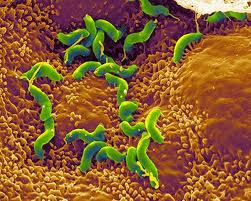The prevalence of Helicobacter pylori has been identified as a risk for the development of stomach cancer. Infection with this microbe has come under more scrutiny, as patients who are seropositive to H. pylori are more likely to develop colorectal cancer than those patients who are seronegative. The green colored bacteria on this image are H. pylori in the gastrointestinal tract.
Dr. Akio Inui from Kagoshima University in Japan has investigated the relationship of this microbe in the development of colon cancer by analyzing data from 332 patients who were screened by virtual colonoscopy (high-resolution colonoscopy) and serological testing for H. pylori. Of the patient group 42 % with H. pylori antibodies had tubular adenomas (precancerous colon cancer lesions) but only 19% of the negative group had colonic cancers. The researchers concluded that more investigations and long-term prospective studies are needed to explore the biological basis of Helicobacter infection and colon cancer.
In the meantime it is important to eradicate infection in order to prevent stomach and colon cancers.
More info on gastritis and H. pylori: http://nethealthbook.com/digestive-system-and-gastrointestinal-disorders/gastritis/
More info on colon cancer: http://nethealthbook.com/cancer-overview/colon-cancer/
Reference: Int. J. Cancer 2005; 117: 1058-1059
Last edited October 30, 2014






